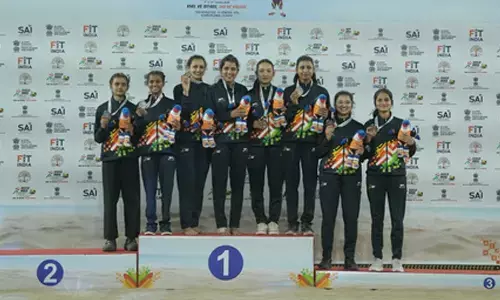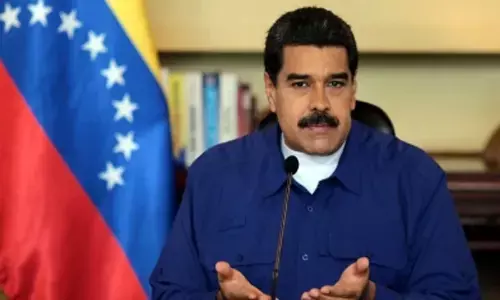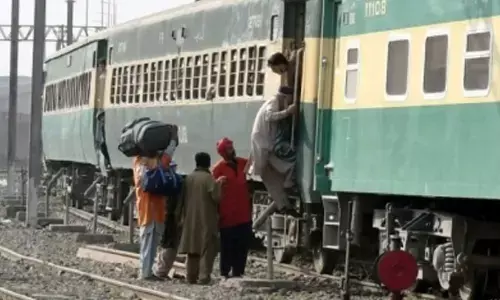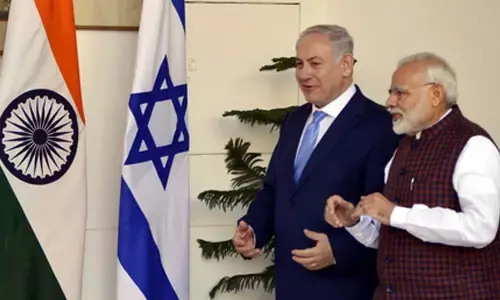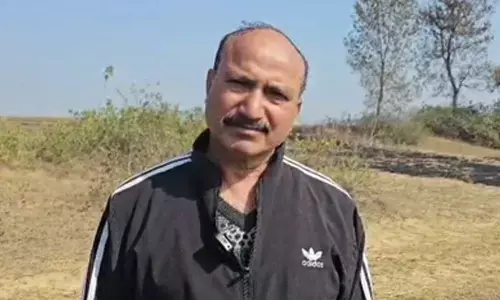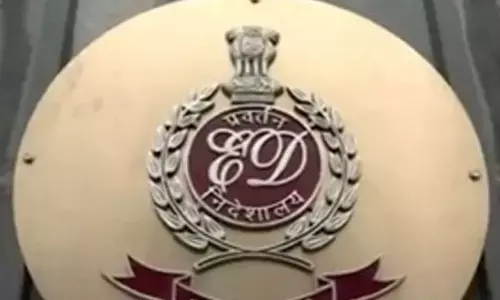Water crisis: country's biggest challenge
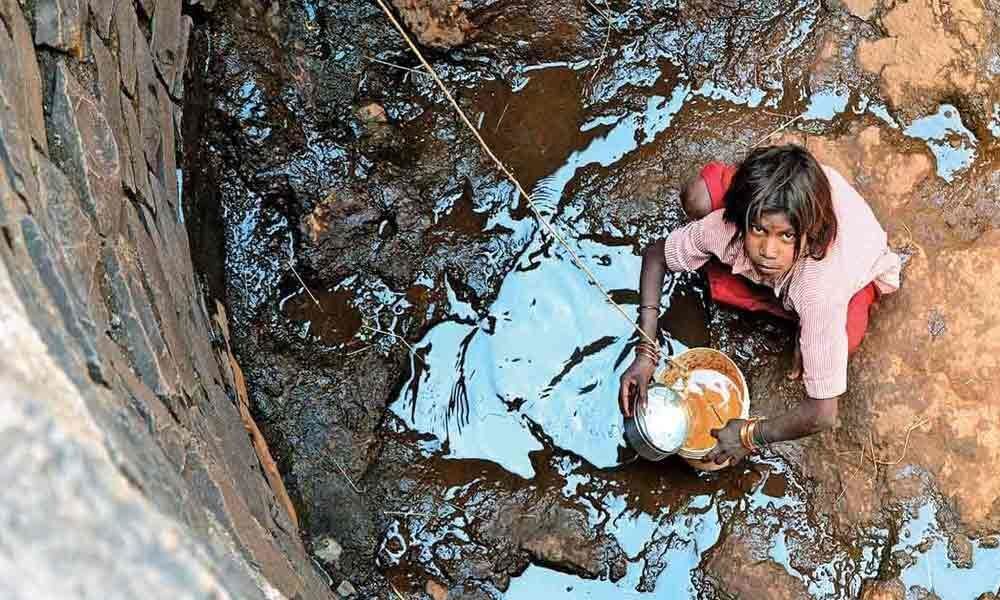 Water crisis: country’s biggest challenge
Water crisis: country’s biggest challengeConflicts over water, both within countries and between them, are sharply increasing. It has been said that the next world war will probably happen on account of water conflicts. Mounting pressure on the water sources the world over, on account of many factors such as the bludgeoning population, rapid urbanisation and the increasing domestic and industrial requirements, low rainfall has made water an extremely scarce commodity.
Climate change is warming the planet and the world is growing even hotter. Clouds are moving away from the equator towards the polls and the "Hadley Cell Expansion" is depriving equatorial regions of life–giving rainwater.
Thus, the fact that more than four–fifths or 80 percent of the earth is covered by water notwithstanding, one is reminded of the lament of Samuel Coleridge "water, water, everywhere, but not a single drop to drink", albeit in a somewhat different context.
On the other hand, one finds the manner in which water is commonly used careless, if not callous. Most of the rainwater is wasted, and groundwater is mined mindlessly, to the extent that even the so-called "sanctuaries" (as Dr M S Swaminathan is fond of referring to them), are exploited with utter disregard to the needs of the future generations.
Close to 30 percent of earth's fresh water lies deep underground in aquifers and is extracted on a daily basis, very often at a dangerously unsustainable rate. This is much more so in India where water is being used faster than it is replenished. Given no change in the situation, 60 percent of the country's aquifers will be in a critical condition very soon. While availability of water is a serious enough issue, persisting weaknesses in its transport, treatment and discharge are adding to the gravity of the problem.
Another related issue is that of value and pricing. The value of water really reflects its price which is arrived at by considering its base value, adding to it the cost of service, namely, transport, treatment and disposal.
Rapidly growing incomes also aggravate the problem as the richer sections of population, demand water–intensive products like meat and energy from fossil fuels. Resolution of water disputes is, thus, assuming increasing importance from the village level to international arena.
History records a conflict over water for irrigation between the cities of Umma and Lagash in ancient Mesopotamia, circa 25 BC. And now, in the early 21st century, water remains a contentious issue between many countries. India has its share of worries too, with having to settle issues with neighbouring Bangladesh over the waters of the Ganga, with China regarding the Brahmaputra and with Pakistan regarding the Indus.
Within the country, water disputes have now percolated to every level. Their intensity is exacerbated by the absence of policy frameworks and mechanisms to govern the use of water resources. Thus, protracted and seemingly unending disputes have been going on between various States for a long time. In peninsular India, the disputes have taken a more complex form.
The dispute between Kerala and Tamil Nadu States about Cauvery waters had to be settled by the Supreme Court. On the Krishna river, while Karnataka and Andhra Pradesh States are at loggerheads about release of water from the Almatti dam, Andhra and Telangana States are engaged in a similar face off in regard to Krishna waters at Srisailam dam.
And agriculture, fisheries and drinking water vie for priority in release from the Krishna barrage. Then there is the ongoing dispute between Telangana and Maharashtra about the waters of the Godavari.
According to entry 17 of the State list of the Constitution of India, water is a State subject. Article 262 provides for Parliament to make laws for the resolution of disputes between States for the use, distribution or control of waters of rivers. Parliament has accordingly enacted the River Board Act 1956 and Interstate Water Disputes Act 1956.
Before one proceeds to the task of finding solutions to the vexing issue of water sharing by States, it is necessary first to comprehend the nature and extent of the crisis and the possible rational criteria that can inform fair and impartial distribution of this scarce resource.
To begin with, it is clear that the challenge facing us, namely that of acute shortage of water which is rapidly assuming the proportions of a major looming and imminent crisis, will need to be addressed before one can talk of sharing it. Various methods can be thought of for resolving the crisis.
Obviously, everything needs to be done to prevent deterioration of the present situation and also to mitigate the possible damage that neglect or delay can cause in the near future. Many important steps will have to be taken, including educating people to change their consumption patterns and lifestyles, devising and using new water conservation techniques, improving methods of recycling waste water, (as has been done in Israel and Singapore), desalinisation, improving irrigation and agricultural practices, ensuring appropriate pricing of water and developing energy-efficient desalinisation plants.
Organising generous response by the public and private systems of the country, as also general public, to emerging challenges such as climate change and consequent alterations in weather patterns is another important measure. Combating practices that deteriorate the situation, such as deforestation and pollution will also be essential.
Coming back to the issue of sharing of river waters, one should be clear, at the very outset, that the aim should be equitable, but not necessarily equal, sharing of waters between the various States. As far as future allocations are concerned, they should largely depend upon various parameters such as the existing shares, the present availability, per capital agricultural Gross Domestic Product (GDP) and the needs of consumption for purposes other than irrigation – such as drinking, irrigation, power generation etc.
The Central and State governments will also need to put in place a "carrot and stick" approach with a view to encouraging desirable programmes by the State government such as rainwater harvesting, putting disaster management imperatives in place, promoting non-conventional methods of power generation and encouraging water conservation practices. Naturally, stringent measures will be needed to discourage if not eliminate, undesirable practices that result in wastage or inefficient use of water.
Another issue that needs to be factored into future efforts is the fact that the productivity of a given quantity of water depends on the level of complementary investments. This maybe in the shape of dams, irrigation projects, or even more general complementary investments in those States.
Therefore, the allocation of water shares will need to depend on investments made in those States. After all, why would a company or government invest in expensive water-saving technologies, when water is cheaper than the technology in question? When the price of receiving clean water is closer to its actual service cost, efficient water use will stand incentivised.
(To be concluded next Thursday)
(The writer is former Chief Secretary, Government of Andhra Pradesh)








